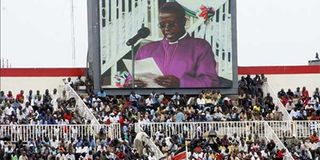Can religious leaders take us beyond 'praying for our country'?

Anglican Bishop Joel Waweru leads prayers during the first Mashujaa Day on October 20,2010 at Nyayo Stadium Nairobi. PHOTO | FREDRICK ONYANGO | NATION
What you need to know:
- The widespread and long, seemingly intractable conflicts in Kenya today point to a systemic weakness in religious teaching and/or practice.
- Some national institutions that ought to reflect the face of nationhood are a shame to look at. In addition, sadly, religious fundamentalism is slowly starting to become a public discourse narrative.
- In light of all these challenges, does religion have a contribution towards making Kenya a better and secure country to live in? After all, there is no other country that we belong to.
Kenya is a 90 plus per cent religious country. One must wonder, then, whether all the weekend and weekday worship and prayer practices across the country add value, or at least, make a difference in promoting mutual co-existence between our sub-cultures, especially religious sub-cultures.
Of course our religious leaders have consistently encouraged us to “pray for our country”. They have cajoled the political leadership to “come together” and “find solutions”, whatever this means.
The question is, can our religious leaders take us beyond “praying for our country” to mapping an inclusive process that restores confidence and care amongst citizens?
Religion, fundamentally, is about love for neighbour and self. Living this principle leads to a culture of understanding and, in times of conflict, an inherent disposition for conflict resolution.
The widespread and long, seemingly intractable conflicts in Kenya today point to a systemic weakness in religious teaching and/or practice.
Obviously, no one is naive enough to expect religion to produce angels, because human nature is prone to committing evil. However, religious practice should play a pivotal role in creating a culture of peaceful co-existence. By its essence, religion has mechanisms for redressing conflicts including those of a political character.
The direction our politics is taking is worrisome. Worrisome because it appears to lack a palpable intent and purpose to reclaim the sovereignty we forcibly got from colonialists.
INCUBATORS FOR DISSENT
Do we have a felt sovereignty that ensures security and self-governance which are the very reasons why our fathers and mothers fought for independence? In other words, do we have a cause to live together? More and more, the reasoning behind the rising insecurity in Kenya seem to suggest we have no reason to co-exist as subcultures.
For instance, while devolution is making a remarkable economic difference in some counties across the country, they are also becoming incubators for dissent towards a sense of nationhood.
Some national institutions that ought to reflect the face of nationhood are a shame to look at. In addition, sadly, religious fundamentalism is slowly starting to become a public discourse narrative.
In light of all these challenges, does religion have a contribution towards making Kenya a better and secure country to live in? After all, there is no other country that we belong to. This “wretched” country is the only boat we have in the middle of a stormy sea. We have to sail through or perish.
VULNERABLE TO MANIPULATION
We learn in religion there are three theological levels of operation. The theology of head helps us to understand the tenets of our religious beliefs and have sufficient reasons for holding on to what is central in them, since we are shaped by what we belief in.
The theology of heart helps us to develop and nurture that conceptually elusive element of faith. It helps us see beyond ourselves and develop a religious value system supportive to neighbor and self. This is the “loving the other” aspect of each religious practitioner.
The third level of operation is the feet theology. That love without action, as it were, is dead. Believers must demonstrate, in deed, love for neighbour. If one has only theology of the head and an inward understanding of love, such a person becomes a fundamentalist.
If one has theology of the heart and very little of the head and feet, such a person becomes vulnerable to manipulation by unscrupulous preachers. If one has substantial theology of the feet without significant head and heart religious knowledge, such a person cares for anyone but often for wrong reasons.
RELIGION SHOULD LEAD
I argue that our religious institutions and structures in Kenya –inclusive of all religions - are so large, so enormous and so diverse that militating against violence and conflict should be a manageable affair.
Ideally, there should no need for the government to run reconciliation and peacebuilding programs in a country that is deeply religious.
Religious leaders need to rekindle their understanding, teaching and practice of the theology of the heart. Out of this flows all forms of faithfulness in leading national efforts towards not just restoring security, but even more compelling, starting an authentic process of reconciliation.
Hope, encouragement and leading by example towards national reconciliation is an expectation that religious followers must not lose of their leaders. If this loss happens, Kenya will easily become a truly committed atheistic country. Religious leadership should lead the search for lasting security, not merely the absence of war that our political leaders are after.





